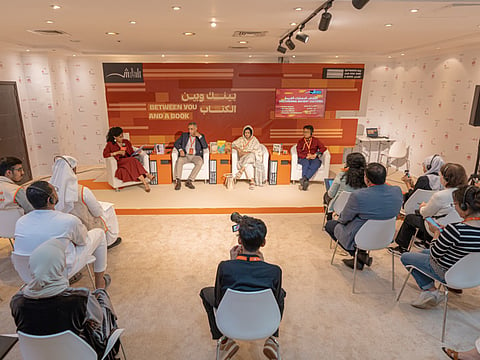Writers at Sharjah International Book Fair explore how ancient cultures shape modern stories
Authors from three countries share how history, heritage and identity influence their work

Sharjah: Writers at the Sharjah International Book Fair (SIBF) highlighted how literature allows readers to step into ancient worlds, deepen their understanding of history and find lessons that continue to shape modern life. Speaking at a panel titled “Discovering Ancient Cultures,” authors from Egypt, Pakistan and Indonesia shared how civilisations of the past influence their storytelling and inspire fresh reflections on identity, humanity and change.
Art as a bridge between past and present
Egyptian novelist Hani Abd AlMurid, known for blending reality with symbolism, spoke about the bond between art and civilisation. “Whatever we write must be written as an art. There is a connection between civilisation and art,” he said.
Hani’s novels often draw from Egypt’s vast heritage, using history, culture and ancient traditions as creative foundations. His best-sellers, including Kyrie Elison and I Am the World, weave narratives rooted in the stories of the pyramids and Egyptian mythology. He recalled buying a Greek novel from a second-hand shop, a moment that pushed him to explore Greek mythology and eventually write about a mythical figure.
As manager of the Nasr Public Library in Egypt, he stressed the role of libraries and young readers in shaping a society’s cultural growth.
Stories born from civilisations
Pakistani researcher, novelist and translator Dr Hina Jamshed said her writing is shaped by her proximity to the Harappan civilisation. Living near the archaeological sites helped her imagine daily life in ancient Harappa and inspired her to craft fiction around it.
“Connecting our past with our present and the present with the future is important,” she said. She added that understanding how ancient communities lived in harmony offers valuable lessons for addressing today’s challenges, including climate change and sustainability.
Travelling through history and identity
Indonesian travel writer and photographer Agustinus Wibowo described travel as a journey through history and self-discovery. As a member of Indonesia’s Chinese diaspora, he said exploring the world helped him reflect on his roots and identity.
“The question of identity is universal,” he noted. “Identities change, and it is more important to promote the civilisation of humanity than the small differences between us.”
Wibowo has travelled through remote regions, including Papua New Guinea and the Tajikistan–Afghanistan border, where he witnessed how a river just 20 metres wide separated communities living a century apart due to historical and social disparities.
The session underscored a shared message: literature remains a powerful gateway to understanding ancient cultures and revealing what binds humanity across time.
Sign up for the Daily Briefing
Get the latest news and updates straight to your inbox



